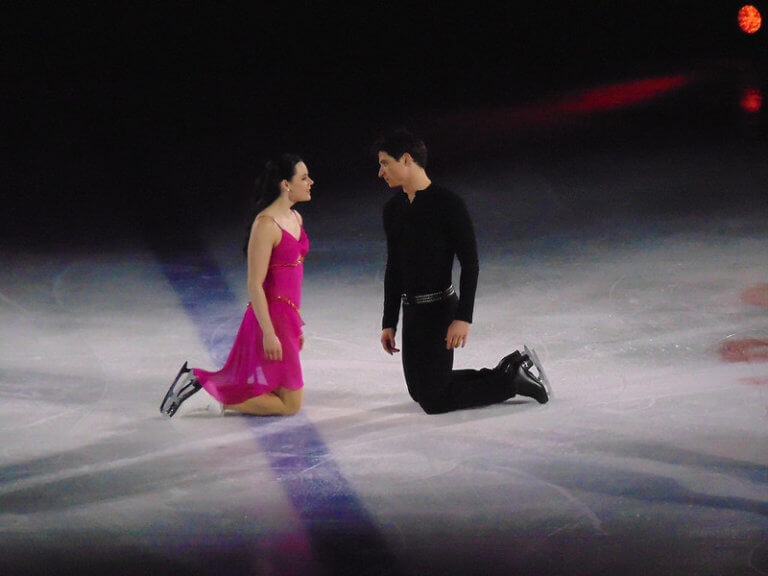(Feature photo credit: Boris Kasimov)
Figure skating is a demanding sport. The combination of grace, speed and strength can be invigorating but also taxing on the body and mind. That’s why figure skating coaches play such a pivotal role in the long-term development of healthy, successful skaters.
With this in mind, we sought out examples of the best figure skating coaches going above and beyond to support their skaters. These inspirational stories show the amazing impact figure skating coaches can have, and the close ties they develop with their skaters.
Elvis Stojko the Figure Skating Coach, Mechanic and Zamboni Driver
When Elvis Stojko retired from competitive skating he needed some time away. He was a house-hold name in Canada and he knew that he wouldn’t get the deeper rest he needed unless he put some distance between himself and his home country. That’s how Stojko ended up in Guadalajara, Mexico.
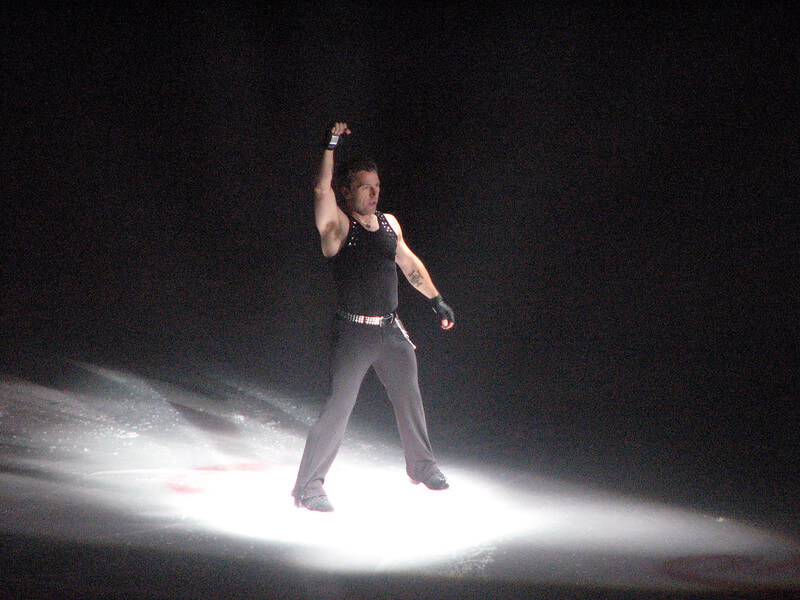
Naturally, after some time passed, Elvis made his way to one of the few ice rinks in Guadalajara. There, he met a Mexican skater named Humberto Contreras and felt inspired to coach him.
Lori Ewing of The Canadian Press spoke with Stojko back in 2009 about his coaching experience. He said, “The best thing is seeing [Contreras’] face when he comes off and the smile and I told him my job is to make you the best skater you can be, and to feel good about what you’re doing and improve all the time.” Clearly, Stojko was invigorated by the enthusiasm Humberto Contreras had for the sport.
But this wasn’t your average coaching gig. Elvis Stojko wasn’t just imparting his World Champion experiences to Contreras, he was fixing the Zamboni and cleaning the ice too. It didn’t matter to Stojko, he was ready to help his skater in any way he could.
Fixing The Frankenboni
When Ewing asked about his mechanical forays with the rink’s Zamboni, Stojko joked that the machine as “a Frankenboni, it’s all different pieces.” From studding the tires, to fixing the blades, conditioner, and water tanks, Stojko went above and beyond to get his skater a fresh sheet of ice so he could train.
But as much as Stojko’s coaching helped Contreras, he also told Ewing that, “coaching Contreras has helped give back the pure love of skating that perhaps had been missing in his life.” It was a mutually beneficial relationship marked with World Champion pedigree and a healthy dose of Zamboni grease.
Asking Olympic Champions for More Than A Desire to Win
Tessa Virtue and Scott Moir are two of the brightest stars in Canadian figure skating history. They are the most decorated figure skaters to ever grace the ice and today they’re always in demand. However, their skill and accomplishments didn’t persuade the coach of their 2018 gold-medal winning Olympic performance.
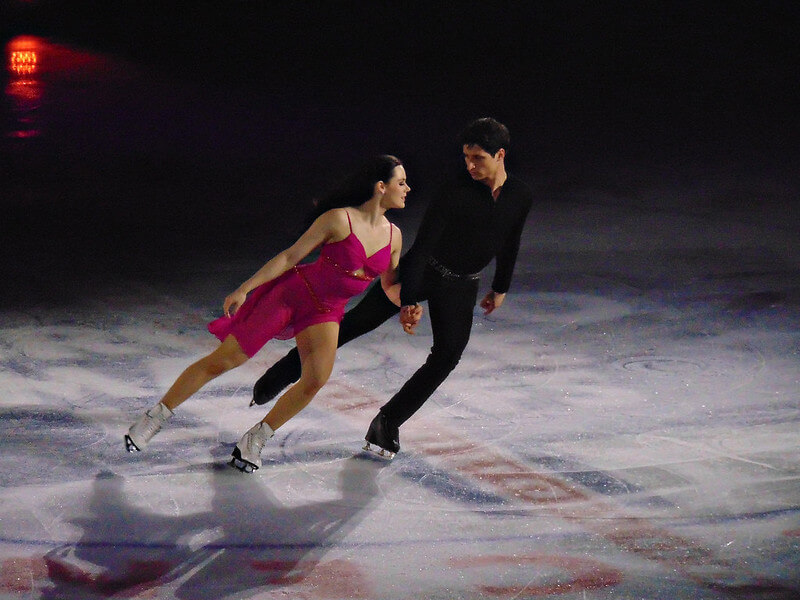
Back in 2014, Virtue and Moir had thought that Sochi would be their last Olympics. But after some reflection, they decided they wanted to return from their 2014 silver medal and seek out a 2018 gold in PyeongChang. As part of their return, they sought out a new coach. But when they decided on Marie-France Dubreuil and Patrice Lauzon as coaches, they were halted in their tracks.
As The Guardian notes, before Patrice Lauzon accepted their coaching request, he asked them to explain their motivation for returning. The resistance caught Moir and Virtue off-guard.
The Best Figure Skating Coaches Want To See A Deeper Purpose
Scott Moir told The Guardian, “We couldn’t get out of it by just saying, ‘We want to win.’ He just said, ‘Well, that might not be enough. You need more than that if you want to come to our school.’ It came down to the fact that we just felt we had more to give.”
It’s apparent that Lauzon wanted a deeper purpose for their return. It couldn’t just be about avenging a silver medal performance from 2014. Their PyeongChang training and performance had to come from a deeper desire.
Moir expanded on the relationship that formed upon this foundation. Telling The National Post, “They’ve been rocks for us. The first meeting that we had with Patrice and Marie-France, we threw everything at these guys. We had baggage, we had everything… I had old, mental things I had to work through and they just handled it so classy.”
When it was all said and done, the story of Virtue and Moir’s gold medal redemption is legendary. But the most decorated figure skaters in history say that their coaching was key. “No, we couldn’t have done any of this without them. We wouldn’t have made it out of the very first summer.”
Many coaches would jump at the opportunity to coach one of history’s greatest ice dancing pairs. Being able to coach such talented skaters would be a joy for any professional and an amazing experience to draw from when coaching other skaters. But, Patrice and Marie-France put Virtue and Moir’s own success at the forefront.
As a result, Tessa and Scott’s return became a vehicle for the pair to give everything they had before hanging up their skates.
Developing Skills Beyond the Ice Rink
Meagan Duhamel retired from competition after winning medals as an Olympian and World Champion pairs skater with Eric Radford. Today, she coaches at Skate Oakville. But on her post-retirement path to coaching she also ran a series of workshops in Ontario. During one such workshop she commented on her coaching focus to Global News.
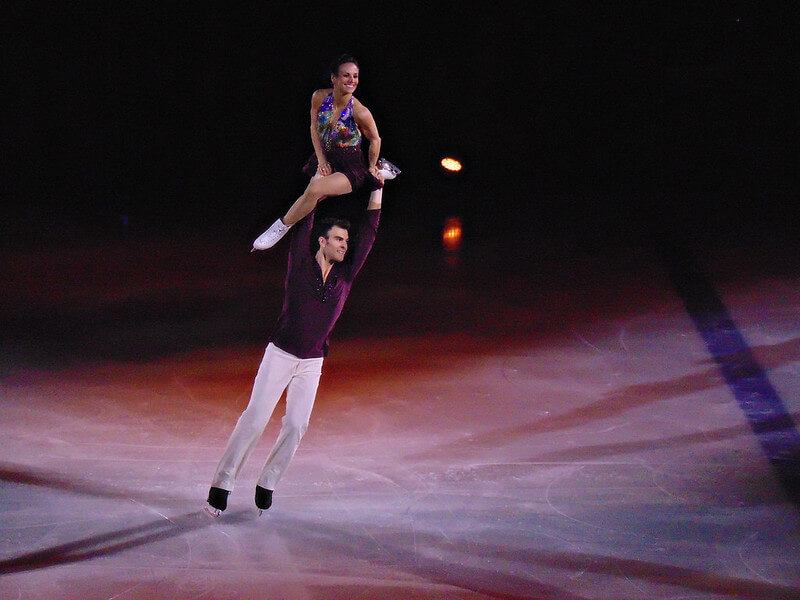
When asked about her coaching Duhamel told Global that her aim was to “try to keep it fun, try to…set some standards and set some rules.” These are comments you might expect from a coach, but she went on to explain, “we focused a lot on the body alignment and the posture, and keeping their head up, and that’s not a light issue, that’s really important for their balance, stability and their growth as human beings and not just skaters – it’s that presence and that confidence.” Clearly, for Duhamel, coaching is about more than just the on-ice results.
After winning gold in the team event and bronze in the pairs event at the 2018 Olympics, Duhamel told Vice: “It took non-stop determination to get to where I am. It took having incredible confidence to continue pursuing my dreams and to do what felt right to me, no matter what others had to say.” For Duhamel, it’s evident that confidence has been integral to her own international success.
By placing importance on confidence building during on-ice instruction Meagan Duhamel is now able to help her skaters develop soft skills that they can carry outside the rink. In this way, great coaches like Duhamel can give their skaters a gift that can last a lifetime.
The Best Figure Skating Coaches Leave A Lasting Impact
The Royal Glenora Skating Club has trained some of Canada’s greatest skaters and in 2011, many of those skaters returned for their Ice Memories Show to help raise funds for the club. Skaters included Kurt Browning, David Pelletier and Jamie Sale, Cody Hay and Annabelle Langlois, Susan Humphreys and Michael Slipchuk, among other past Royal Glenora members.
Jamie Sale commented on the nostalgia of her return to Royal Glenora when speaking with the Edmonton Journal. She said, “When I was a kid, this was a wonderland, it was amazing.” The Edmonton Journal noted that Sale “added that a number of the skaters returned this weekend because of longtime Glenora coach Jan Ullmark.” Suggesting that some of the country’s most prominent figure skating stars still hold a special place in their hearts for the coach, long after their competitive careers ended.
Sale expanded upon this saying, “He’s such a great coach and a great person. We’re happy to do it and raise some money for a club that helped us through all of our trials and tribulations.” Clearly, the impact of great figure skating coaching doesn’t fade with the end of the skater’s competitive career. As Jamie Sale and the return of so many high-profile skaters shows, the value of good coaching is something that always stays with a skater.
Support During the Tragic Loss of Family
The story of Joannie Rochette captured the world’s attention. Just days before competing in the 2010 Vancouver Olympic Games, Rochette’s mother died of a sudden heart attack. It was a devastating tragedy during the lead up to the biggest moment of Rochette’s competitive career.
The New York Times reported that with the help of her coach, Manon Perron, Rochette decided she was going to skate in the Olympics in honour of her mother. According to the Times, Perron said, “you have to retake control over your life by skating.” During an unimaginably difficult time, Rochette leaned on her coach’s words.
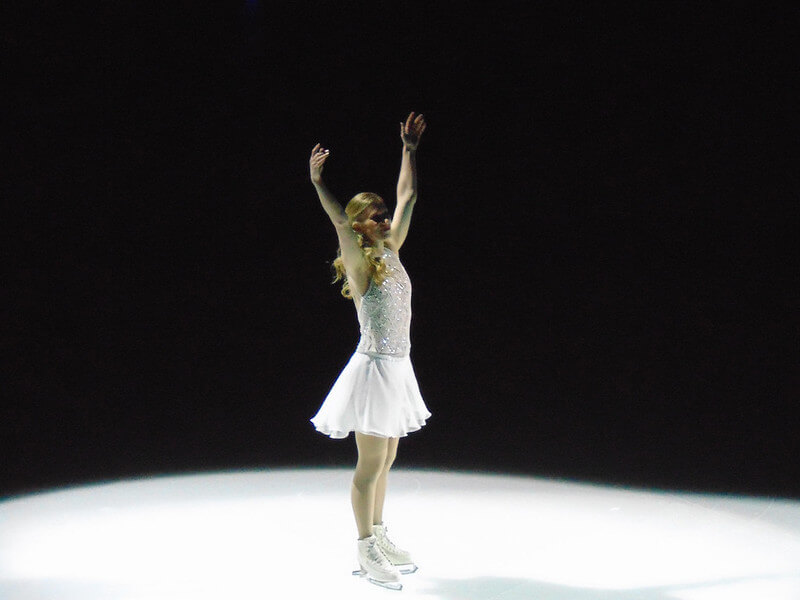
The world watched as Rochette recorded a new personal best in her short program and went on to win an Olympic bronze medal.
During the whole process, Perron was by Rochette’s side. They visited the hospital together to say one final goodbye to Joannie’s mother, and they supported each other through Rochette’s Olympic bronze medal journey.
The Times explained that, “[at] times, it was Rochette who would break down into tears. Perron would comfort her. Other times, it was Perron who would cry. Rochette, in turn, was her support.” The challenge was unimaginable, and it took the strength of both women to honour Rochette’s mother and achieve an Olympic dream.
From this indescribable challenge, came an inspiring story of a world-class competitor, her coach and their strength together.
Rediscovering A Love of Skating After Injury
In September 2014, Kaetlyn Osmond suffered a broken leg during training. What followed were surgeries, rehab and legitimate doubts about whether she wanted to continue skating.
If you’ve read our account of Kaetlyn Osmond in our article about female athlete role models, you know she came back from her injury even stronger than before. However, her future successes were in jeopardy as she traveled the long path to recovery.
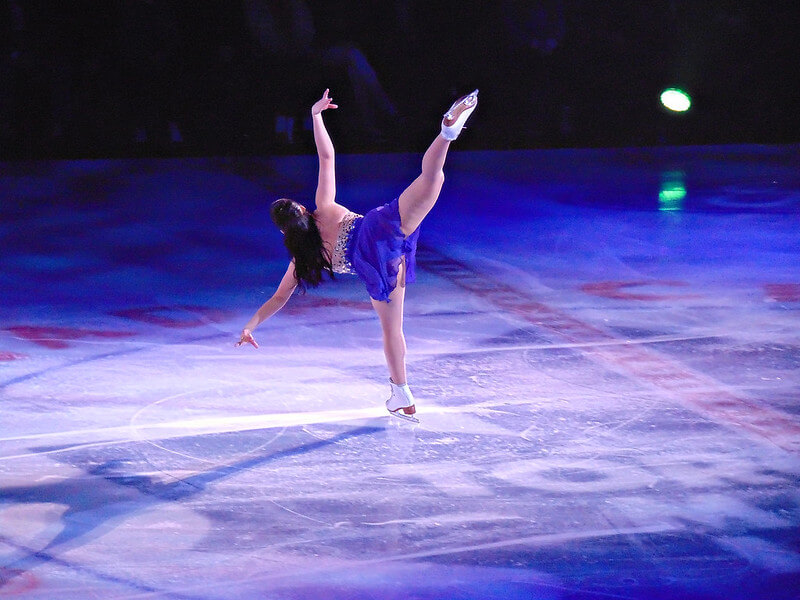
In 2017, the National Post wrote that “she credits [her coach] for his key role in what has already been a stunning comeback.” In the article, Osmond explained that her coach, Ravi Walia was there to push her when she had her doubts. But Walia, didn’t stop with motivation, he also found ways to help Osmond rediscover her passion.
She told the National Post that, “He reminded me of what it was like to skate. He brought me to seminars where I could help coach. He brought me to small shows. Anything to remind me of why I love skating.” Similar to Patrice Lauzon, it’s clear that Walia knew that a comeback needs to be built upon a foundation of passion for the sport.
Kaetlyn Osmond went on to win an Olympic gold in team and bronze in singles events in 2018. One month later she captured gold at the World Championships in Milan, Italy. In doing so, she became the first Canadian woman to win a World Championship title in 45 years.
Since retiring, Osmond has begun coaching and founded Off The Rock skating workshops to pass on her experience, knowledge and love for the sport.
A Figure Skating Coach Turned Ice Dance Partner
The common theme that reveals itself through these stories are coaches who do whatever it takes to help their skaters advance toward achieving their dreams. Back in 2014, Piper Gilles and Paul Poirier had their coach step-up in a similarly unexpected way.
After Poirier suffered a serious ankle injury, their choreographer, Juris Razgulajevs stepped in. Gilles needed a partner that could skate with her and Poirer needed to see their routine in action. So, Razgulajevs laced up his skates and began dancing with Gilles while Poirier watched from the sidelines.
Gilles later told Absolute Skating, “We had to be really creative about how we trained,” as they did their best to keep their training moving forward even with Poirier sidelined.
Ultimately Poirier and Gilles missed the Olympic selection for the 2014 Games in Sochi. However, the compressed and creative training helped reshape their mindset.
After the season Porier told Absolute Skating, “I think last season really helped because we saw how effective our training could be even if it was limited, so now when we had this extra time all of a sudden and we had all the skills to really maximize it, we had a really good off season of training.” As it turns out, all of their creative training helped the pair take a big step forward.

Since that time, the duo has gone on to skate in 2018 Pyeongchang Olympics and 2022 Beijing Olympics. They’ve also captured Four Continents bronze, silver and most recently won the 2020 and 2022 Canadian Championships.
The Best Figure Skating Coaches Do Whatever It Takes
It’s clear that the best figure skating coaches support their skaters to reach their dreams, no matter what it takes. Whether it’s fixing a Zamboni, challenging world class skaters to rediscover their passion, training youth to hold their heads high with confidence, or supporting an athlete through a tragic loss; the best figure skating coaches can have an amazing impact on the lives of their skaters.
That’s why we love to support coaches and clubs as they elevate the confidence and capabilities of today’s youth. Furthermore, it’s why we’ve designed our figure skating software to go above and beyond with automation. When clubs and coaches can automate their administrative work with Uplifter, they can focus more energy on supporting their skaters.
If you’re interested in learning more, you can see what figure skating clubs are saying about Uplifter here.

